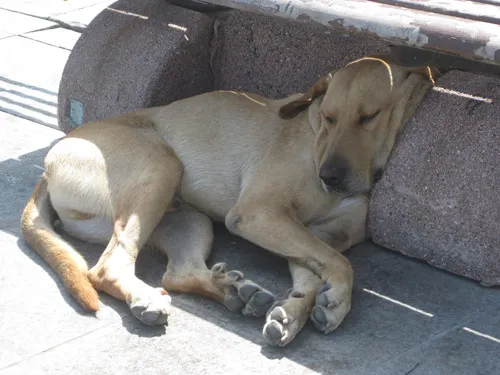Istanbul: The Maddest City in Europe
“That’s the fattest stray dog I’ve ever seen.” A lot has changed here since Mark Twain wrote about the city, but there’s still plenty of mayhem
/https://tf-cmsv2-smithsonianmag-media.s3.amazonaws.com/filer/20110927121011istanbul-fisherman-small.jpg)
Miles from even the suburbs, hours before it can be seen on the distant horizon, Istanbul can be felt. It seems to get louder and hotter as one gets nearer. The traffic thickens. Dust and cement replace grassy goat pastures. Freeways begin to crisscross the land in a madhouse maze. Like space junk careening around an overpopulated planet, trucks and buses converge and cross paths from all directions, blasting the cyclist who dodges among them with fiery belches of exhaust. By 4 p.m., I had come 100 miles and was immersed in metropolitan mayhem, yet the city center remained 20 miles away.
By 8 p.m., I was sunburned, famished, exhausted—yet energized by the intensity of the city. I crossed the Galata Bridge, where scores of fishermen dangle lines into the waters of the Golden Horn, occasionally landing a sardine. On either end, vendors sell corn on the cob and pastries to the throngs of pedestrians, and the traffic—gridlock of the worst order—grinds along as cabbies honk endlessly. I met a friend, Irem, in the Beşiktaş neighborhood, a prosperous downtown port district. She led me several blocks up a steep and winding cobblestone street, through a doorway, down a flight of stairs and into her silent, neat and orderly apartment. I marveled that peace and privacy can be found in Europe’s maddest city.
Istanbul, once a hub of Eastern dress, food, architecture and exotic customs, is today more like Paris or London. There are skyscrapers, two huge suspension bridges linking Europe to Asia and ridiculously cumbersome SUVs on the narrow streets. In many aspects, it looks like just another westernized city. But the many old buildings and huge monuments still remind us of the centuries that have passed.
There is a trace of conservatism. Men growl obscenities at Irem as we walk through Beşiktaş during rush hour one evening. I can hear nothing, but she catches their words, spoken from behind cigarettes and mustaches. “These men! They’re pigs!” she says, shaking her head, clearly familiar with such behavior. “It’s because this is a repressed culture.”

The teeming stray dogs are mostly large, handsome animals, and they navigate the traffic and lie on the sidewalks of the quieter streets, often receiving a pat from passersby. They are treated well. Boys throw them balls along the waterfront and kneel to offer them bread. Some of the dogs are a bit wiry, but few fit the description of Mark Twain, who wrote of “the celebrated dogs of Constantinople” as starved, foul, exhausted and wretched. Today, their descendants wag their tails at life. “That’s the fattest stray dog I’ve ever seen,” I declare to Irem as we walk along Barbaros Boulevard one evening. Other travelers have observed the same.
Cats, too, heavily populate the city. One may see three or four homeless tabbies at a time on any backstreet in Istanbul. We must keep the windows shut or they’ll spill into the apartment. Posing by flower pots and licking themselves on the promenade, the cats make popular photo subjects, and in shops tourists may find coffee table books and postcards depicting “The Cats of Istanbul.”
Asia is just across the Bosporus Strait—a continental boundary as arbitrary as they get. Seven minutes and 2 lira on a ferry lands me in Uskudar on Friday morning, after three days in town, and I pedal north along the Bosporus toward the mouth of the Black Sea. An hour later I am in the countryside. I sleep on a hilltop near Şile, in a forest of chestnuts and hazelnuts, the turquoise Black Sea just a mile away, and the only sign of the densest, most frenetic, most inspiring of aggregations of humans on the planet is a calm glow on the southwest horizon.
Planning Your Next Trip?
Explore great travel deals
Smithsonian magazine participates in affiliate link advertising programs. If you purchase an item through these links, we receive a commission.
/https://tf-cmsv2-smithsonianmag-media.s3.amazonaws.com/accounts/headshot/Off-Road-alastair-bland-240.jpg)
/https://tf-cmsv2-smithsonianmag-media.s3.amazonaws.com/accounts/headshot/Off-Road-alastair-bland-240.jpg)